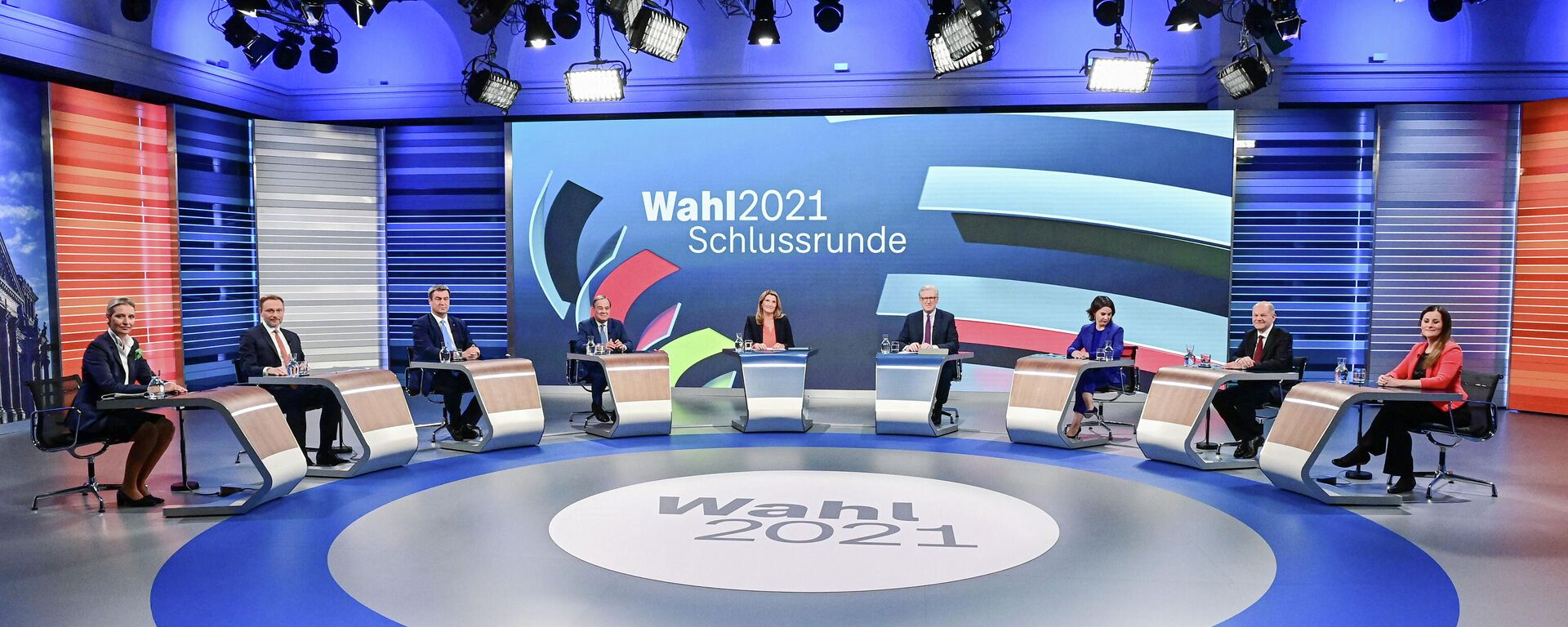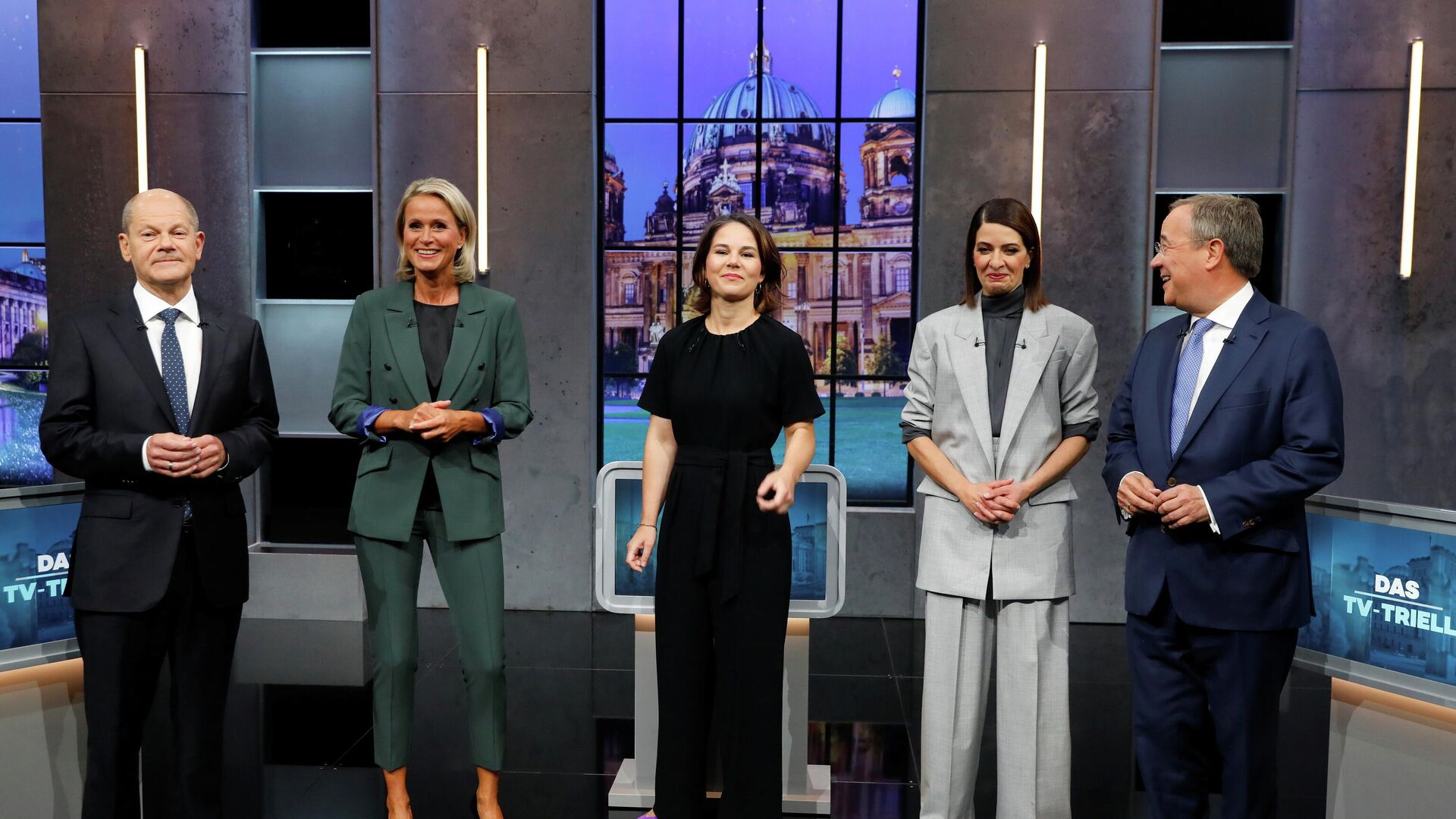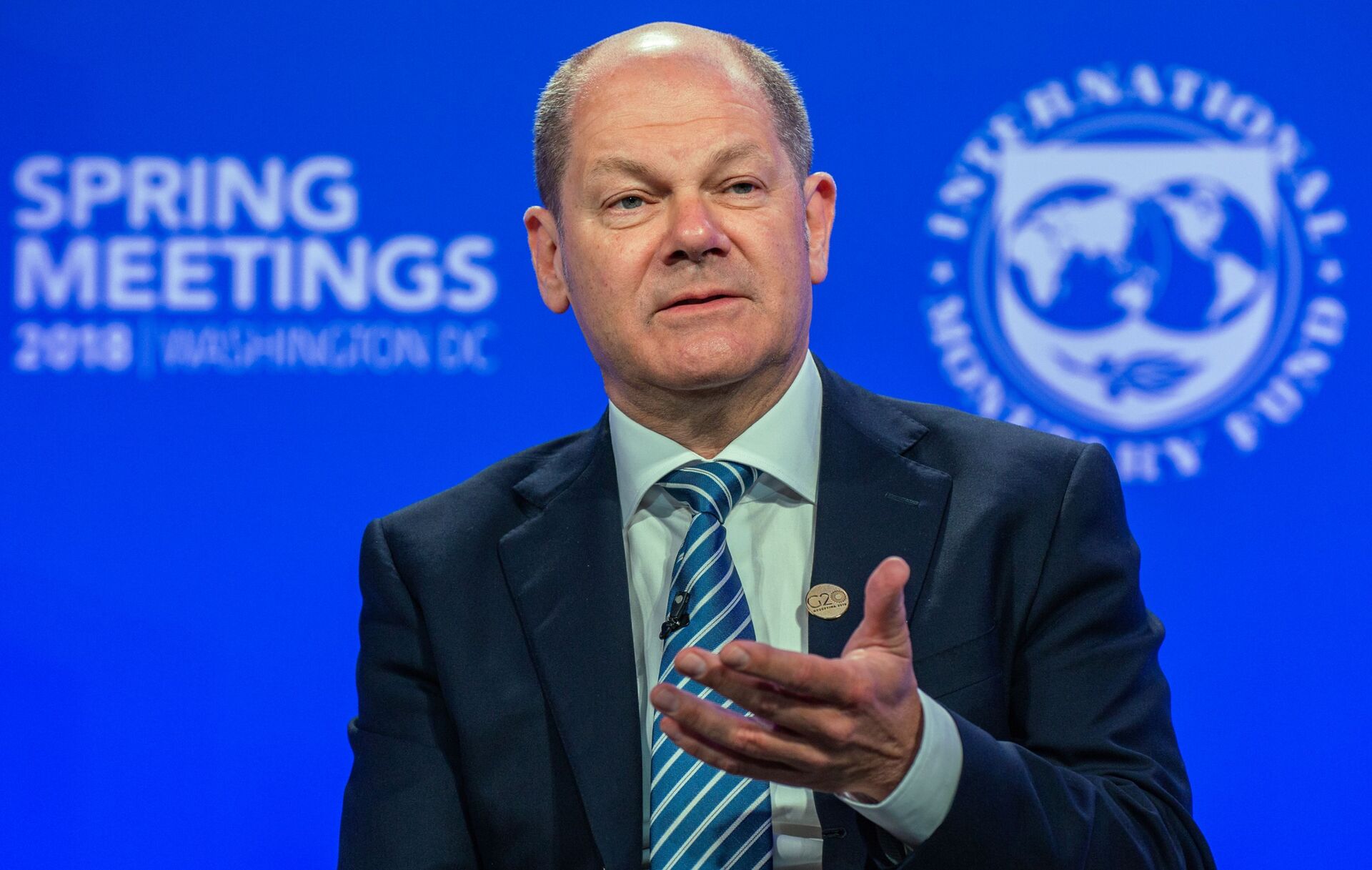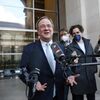https://sputnikglobe.com/20210924/final-debates-see-german-chancellor-candidates-clash-on-foreign-policy-nord-stream-2-green-habits-1089375313.html
Final Debates See German Chancellor Candidates Clash on Foreign Policy, Nord Stream 2, Green Habits
Final Debates See German Chancellor Candidates Clash on Foreign Policy, Nord Stream 2, Green Habits
Sputnik International
German Chancellor Hopefuls Clash on Foreign Policy, Nord Stream 2, Green Habits in Last Debates
2021-09-24T15:57+0000
2021-09-24T15:57+0000
2021-09-24T15:57+0000
bundestag
europe
germany
debate
https://cdn1.img.sputnikglobe.com/img/07e5/09/18/1089375150_0:0:3073:1730_1920x0_80_0_0_c26586f456c442e2bfefb7b0f88e805a.jpg
Representatives of seven German political parties met on 23 September in the last round of debates ahead of the general election, discussing a wide range of issues from domestic security and COVID-19 restrictions, to foreign policy and recent diplomatic developments.The politicians, who will be fighting to replace a retiring Angela Merkel, clashed on most issues, laying bare how the parties disagree on policy. However, the latest poll results show no solid winner or even two parties that are projected to grab more than 50 percent together. This means a likely coalition of three parties and a lot of negotiations on issues about which they disagreed so vehemently in the 23 September debates.United on European Front, Divided on Everything BeyondProbably the only thing the chancellor hopefuls agreed on is the need for a stronger and more sovereign European Union - with the exception of Alice Weidel from the EU sceptic Alternative for Germany (AfD). Armin Laschet, the Christian Democratic Union (CDU) candidate promoted by Merkel herself, argued that the EU should boost spending on common defence projects, so that the bloc could act even "when the US is withdrawing", referring to the chaotic departure from Afghanistan.Quitting Afghanistan was not the only topic where the reliability of relations with the US was questioned during the debates. Commenting on the recent argument between Paris and Washington over AUKUS, Social Democratic Party (SDP) candidate Olaf Scholz, who polls highest among the chancellor hopefuls, said he understands France's irritation. However, he did not back Laschet's ideas for European defence, opting rather for closer cooperation with the US.There was no unity among the candidates regarding the voluntary goal of 2 percent of GDP defence spending set by NATO, enforced by former US President Donald Trump and seemingly ignored by Merkel. SDP's Scholz floated the idea of defence spending constrained by "the bounds of economic realities" without ruling out the 2 percent goal. However, Janine Wissler of the Left Party argued that "more weapons definitely will not make the world safer". AfD's Weidel in turn suggested dissolving NATO for good in favour of a "collective security alliance".The opinions of the chancellor hopefuls were also divided on the matter of the trade and investment ties Germany and the EU's have with China. Both the Green Party candidate, Annalena Baerbock, and Free Democratic Party (FDP) chief, Christian Lindner, criticised the investment deal between Brussels and Beijing which was so enthusiastically espoused by Merkel last year. Baerbock suggested bringing a "collective European China policy" to the table that would feature a "tough stance" on the country. Lindner in turn said the government should protect German business interests and values.Markus Söder from the Christian Socialist Union, an ally of the CDU, then proceeded to say that Germany should adopt a more favourable treatment towards China, bearing in mind - just as the FDP leader suggested - that some German business interests lie in China itself.All Things Green, Including Nord Stream 2Climate change issues and green politics have long become one of the central issues in German politics and so it was no wonder that candidates put a heavy emphasis on the topic during the 23 September debates. What was odd, however, was that they seemingly focused not so much on government-wide policies, but on their personal examples of pro-environmental behaviour: CDU's Laschet boasted using an electric car, AfD's Weidel reduced her carbon footprint by using a bike whenever she could and the FDP candidate opted to buy CO2 certificates. SDP's Scholz was the only one openly to admit that his "carbon emissions" remain high because of frequent travel as the country's Finance Minister.The division between parties' policies was evident in their green policies. Although the Green candidate pushed for earlier abandonment of coal energy in the country and opposed the launch of the Nord Stream 2 gas pipeline, the candidate from the ruling CDU party took issue with her suggestion defending the pipeline that is capable of delivering 55 million cubic metres of Russian gas per year and arguing that Germany will need this fuel if it is to seek to "get out of all energy sources" that have a significant impact on the environment.Laschet also argued that sufficient safeguards exist to protect Ukrainian gas transporting issues from being violated by the new pipeline:The AfD candidate, Alice Weidel, in turn, questioned the effect of energy generation on climate change and urged that German businesses be protected from being affected by environmental politics. She stood firmly for boosting the country's nuclear energy generation, instead of curbing it.Such dire disagreements on important policy points are bound to complicate the formation of a government after the September election. No party is likely to secure a majority, meaning that a coalition government will be formed. As the history of Merkel's 16-year rule showed, even negotiations with one party on a matter can be difficult and prolonged.They might turn even more difficult if a two-party union turns out not to be enough to form a majority – the latest ZDF poll suggests that SPD and CDU/CSU will only get 48 percent jointly, and their union for another term is far from guaranteed. Consolidating the divided views of the three parties might be a tough nut to crack in future talks for the new post-Merkel coalition government.
https://sputnikglobe.com/20210924/final-countdown-whos-leading-in-polls-ahead-of-german-federal-elections--1089365973.html
germany
Sputnik International
feedback@sputniknews.com
+74956456601
MIA „Rossiya Segodnya“
2021
Tim Korso
https://cdn1.img.sputnikglobe.com/img/07e6/03/0d/1093831826_0:0:216:216_100x100_80_0_0_e3f43a960af0c6c99f7eb8ccbf5f812c.jpg
Tim Korso
https://cdn1.img.sputnikglobe.com/img/07e6/03/0d/1093831826_0:0:216:216_100x100_80_0_0_e3f43a960af0c6c99f7eb8ccbf5f812c.jpg
News
en_EN
Sputnik International
feedback@sputniknews.com
+74956456601
MIA „Rossiya Segodnya“
Sputnik International
feedback@sputniknews.com
+74956456601
MIA „Rossiya Segodnya“
Tim Korso
https://cdn1.img.sputnikglobe.com/img/07e6/03/0d/1093831826_0:0:216:216_100x100_80_0_0_e3f43a960af0c6c99f7eb8ccbf5f812c.jpg
last german debates
Final Debates See German Chancellor Candidates Clash on Foreign Policy, Nord Stream 2, Green Habits
The last round of debates ahead of the 26 September election in the Bundestag finally brought together all the participating parties - a departure from previous debates where only three main contenders took part. Their wrangling and indecisive poll results suggest hard coalition talks loom once the election is over.
Representatives of seven German political parties met on 23 September in the last round of debates ahead of the general election, discussing a wide range of issues from domestic security and COVID-19 restrictions, to foreign policy and recent diplomatic developments.
The politicians, who will be fighting to replace a retiring Angela Merkel, clashed on most issues, laying bare how the parties disagree on policy. However, the
latest poll results show no solid winner or even two parties that are projected to grab more than 50 percent together. This means a likely coalition of three parties and a lot of negotiations on issues about which they disagreed so vehemently in the 23 September debates.
United on European Front, Divided on Everything Beyond
Probably the only thing the chancellor hopefuls agreed on is the need for a stronger and more sovereign European Union - with the exception of Alice Weidel from the EU sceptic Alternative for Germany (AfD). Armin Laschet, the Christian Democratic Union (CDU) candidate promoted by Merkel herself, argued that the EU should boost spending on common defence projects, so that the bloc could act even "when the US is withdrawing", referring to the chaotic departure from Afghanistan.
Quitting Afghanistan was not the only topic where the reliability of relations with the US was questioned during the debates. Commenting on the recent argument between Paris and Washington over AUKUS, Social Democratic Party (SDP) candidate Olaf Scholz, who polls highest among the chancellor hopefuls, said he understands France's irritation. However, he did not back Laschet's
ideas for European defence, opting rather for closer cooperation with the US.
There was no unity among the candidates regarding the voluntary goal of 2 percent of GDP defence spending set by NATO, enforced by former US President Donald Trump and seemingly ignored by Merkel. SDP's Scholz floated the idea of defence spending constrained by "the bounds of economic realities" without ruling out the 2 percent goal. However, Janine Wissler of the Left Party argued that "more weapons definitely will not make the world safer". AfD's Weidel in turn suggested dissolving NATO for good in favour of a "collective security alliance".
The opinions of the chancellor hopefuls were also divided on the matter of the trade and investment ties Germany and the EU's have with China. Both the Green Party candidate, Annalena Baerbock, and Free Democratic Party (FDP) chief, Christian Lindner, criticised the investment deal between Brussels and Beijing which was so enthusiastically espoused by Merkel last year. Baerbock suggested bringing a "collective European China policy" to the table that would feature a "tough stance" on the country. Lindner in turn said the government should protect German business interests and values.
Markus Söder from the Christian Socialist Union, an ally of the CDU, then proceeded to say that Germany should adopt a more favourable treatment towards China, bearing in mind - just as the FDP leader suggested - that some German business interests lie in China itself.
All Things Green, Including Nord Stream 2
Climate change issues and green politics have long become one of the central issues in German politics and so it was no wonder that candidates put a heavy emphasis on the topic during the 23 September debates. What was odd, however, was that they seemingly focused not so much on government-wide policies, but on their personal examples of pro-environmental behaviour: CDU's Laschet boasted using an electric car, AfD's Weidel reduced her carbon footprint by using a bike whenever she could and the FDP candidate opted to buy CO2 certificates. SDP's Scholz was the only one openly to admit that his "carbon emissions" remain high because of frequent travel as the country's Finance Minister.
The division between parties' policies was evident in their green policies. Although the Green candidate pushed for earlier abandonment of coal energy in the country and
opposed the launch of the Nord Stream 2 gas pipeline, the candidate from the ruling CDU party took issue with her suggestion defending the pipeline that is capable of delivering 55 million cubic metres of Russian gas per year and arguing that Germany will need this fuel if it is to seek to "get out of all energy sources" that have a significant impact on the environment.
Laschet also argued that
sufficient safeguards exist to protect Ukrainian gas transporting issues from being violated by the new pipeline:
"Yes, we need this economic project, because if we are stopping other forms of energy we will need the gas. What's important to me is that the deal that the government agreed to stands - namely that Ukraine as a transit country suffers no disadvantages as a result. Should Russia breach this agreement, then the deal would be stopped immediately."
Armin Laschet
Chairman of the Christian Democratic Union
The AfD candidate, Alice Weidel, in turn, questioned the effect of energy generation on climate change and urged that German businesses be protected from being affected by environmental politics. She stood firmly for boosting the country's nuclear energy generation, instead of curbing it.

24 September 2021, 11:33 GMT
Such dire disagreements on important policy points are bound to complicate the formation of a government after the September election. No party is likely to secure a majority, meaning that a coalition government will be formed. As the history of Merkel's 16-year rule showed, even negotiations with one party on a matter can be difficult and prolonged.
They might turn even more difficult if a two-party union turns out not to be enough to form a majority – the latest ZDF poll suggests that SPD and CDU/CSU will only get 48 percent jointly, and their union for another term is far from guaranteed. Consolidating the divided views of the three parties might be a tough nut to crack in future talks for the
new post-Merkel coalition government.







